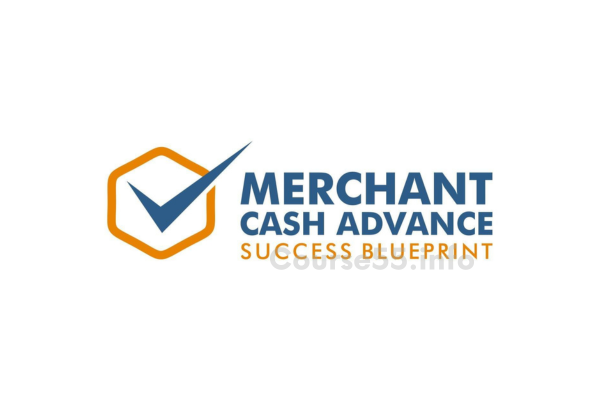Merchant Cash Advance Success Blueprint
$897.00 Original price was: $897.00.$53.90Current price is: $53.90.
Merchant Cash Advance Success Blueprint: A Comprehensive Review – Immediate Download!
Let See The Content Inside This Course:
Description:
In the ever-changing world of commercial finance, the merchant cash advance (MCA) sector is developing quickly and providing creative answers for companies in need of short-term capital. Businesses can obtain instant cash flow with an MCA without having to go through the drawn-out approval procedures that come with conventional loans. The MCA industry is examined in detail in this article, along with its salient characteristics, advantages, and possible disadvantages. Business owners can choose their funding choices wisely by being aware of the merchant cash advance success strategy.

Overview of Merchant Cash Advances
A merchant cash advance is a financial product tailored to provide businesses with a lump sum payment in exchange for a percentage of future credit card sales. This model is particularly advantageous for small businesses facing sudden cash flow challenges, allowing them to address urgent needs quickly. Unlike traditional loans that may require substantial documentation and long waiting periods for approval, MCAs streamline the funding process, making it an ideal option for entrepreneurs who need capital without the usual delays.
One of the most appealing aspects of an MCA is its flexibility. Business owners can access funds swiftly, often within days of their application being approved. This speed is crucial for businesses that need immediate financial support to seize opportunities, stabilize operations during lean periods, or address unforeseen expenses. Moreover, the repayment structure of MCAs where payments are deducted directly from daily credit card sales means that businesses are not bound to fixed repayment schedules. Instead, their repayments align with their sales, easing financial pressure during slower months.
Key Features
- Fast Access to Funds
One of the standout features of an MCA is its rapid funding capability. Many providers can approve an application and transfer funds within a matter of days. This is particularly beneficial for businesses facing urgent cash flow needs, such as restocking inventory, covering operating expenses, or handling unexpected costs. The quick processing times significantly outpace traditional loans, where approval can take weeks or even months. - Flexible Repayment
The repayment model of an MCA is inherently flexible, as payment amounts are contingent on the business’s daily credit card sales. If sales are low, the repayment amount decreases, providing a buffer for businesses during tough times. This feature allows owners to better manage their cash flow and avoid the stress of fixed monthly installments that can strain finances. - No Collateral Required
Another attractive feature is the absence of collateral requirements. Unlike traditional business loans, which often necessitate securing obligations with physical assets, MCAs do not typically require collateral. This lack of collateral makes them more accessible for startups or small businesses that may not possess significant assets to pledge.
Eligibility Criteria
To qualify for an MCA, businesses generally need to meet specific criteria, which aid providers in assessing the risk involved in funding the advance. Here are the primary eligibility requirements:
- Minimum Time in Business: Most MCA providers require that the business has been operational for at least six months to one year. This ensures that the borrower has a track record of generating revenue and managing operations effectively.
- Consistent Credit Card Sales: The business must demonstrate a steady monthly credit card sales volume, typically around $5,000 or more. This criterion ensures that there is sufficient revenue from which the provider can deduct repayments.
- Credit Score Requirements: While credit scores are considered, many MCA providers adopt a more lenient approach than traditional lenders. This characteristic makes MCAs available to businesses with lower credit scores, thus offering financial support to a wider range of entrepreneurs who may struggle to secure conventional loans.
Costs and Fees
Business owners should be mindful of the fees associated with MCAs, despite the fact that they offer many benefits. Usually, a factor rate between 1.1 and 1.5 is used to determine the overall repayment amount. This implies that companies should anticipate paying back between 110% and 150% of the loan balance. For example, a business borrowing $10,000 at a factor rate of 1.3 would have to pay back $13,000 in total.
The total cost of obtaining an MCA may also increase due to origination and administrative fees that providers may impose. To properly comprehend the entire financial commitment, business owners should carefully go over all conditions and costs related to the advance.
Pros and Cons
Pros:
- Quick Access to Funds: MCAs allow businesses to access needed capital swiftly, addressing pressing financial needs without delay.
- Flexible Repayments: The repayment structure that adjusts based on sales revenue can help businesses manage their cash flow more effectively, particularly during slower seasons.
- Easier Qualification Criteria: Compared to traditional loans, the eligibility requirements for MCAs are more lenient, making them a viable option for many small business owners.
Cons:
- Potentially High Costs: The factor rates associated with MCAs can lead to substantial overall repayment amounts, and business owners must evaluate whether the cost justifies the financial relief.
- Shorter Repayment Timelines: MCAs often come with shorter repayment periods, which can strain cash flow, especially for businesses that experience fluctuations in revenue.
- Risk of Debt Cycle: There is a concern that businesses might enter a cycle of debt if they rely on MCAs repeatedly to meet their cash flow needs. This situation can increase financial instability.
Current Trends in the MCA Industry
As the MCA industry continues to evolve, several trends are beginning to shape its landscape. Understanding these trends can provide insight into the future of short-term business financing:
- Increased Technology Adoption: The integration of advanced technology and automation in the application and approval processes is minimizing wait times and enhancing the customer experience. These innovations are allowing MCA providers to assess applications faster and more efficiently.
- Diversification of Financial Solutions: Many MCA providers are expanding their offerings beyond cash advances. This diversification includes products such as lines of credit and invoice financing, allowing businesses to choose financing solutions that best meet their unique needs.
- Emphasis on Compliance and Transparency: With increasing regulations in the financial sector, there is a growing emphasis on ensuring that MCA providers maintain compliance and transparency. This trend aims to protect business owners from predatory practices and ensure they fully understand the terms of their financing.
Conclusion
A key framework for comprehending the complexities of MCAs, including their benefits, hazards, and operational mechanics, is the merchant cash advance success plan. Entrepreneurs must do extensive research, take into account their financial situation, and look into other financing possibilities even if MCAs can offer vital finance for companies in need. By doing this, they can protect their financial stability and make well-informed decisions that support their corporate objectives. Business owners may successfully navigate their financing path if they have the necessary expertise, despite the fast-paced nature of the MCA industry providing both opportunities and problems.
Frequently Requested Enquiries:
Innovation in Business Models: We employ a group buying strategy that allows customers to divide costs and receive a lower rate for popular courses. Despite content providers’ concerns about distribution tactics, this approach benefits low-income individuals.
Legal Aspects: The legality of our conduct raises a number of complex issues. Although we do not have the course developer’s official permission to redistribute their content, there are no clear resale restrictions stated at the time of purchase. We have the opportunity to provide affordable educational resources because of this uncertainty.
Quality Control: We ensure that all of the course materials we purchase are identical to those supplied by the writers. However, it is important to understand that we are not approved vendors. Consequently, our products don’t include:
– In-person consultations or phone conversations with the course developer for advice.
– Access to sites or organizations that are exclusive to authors.
– Engaging in private forums.
– Simple email support from the author or their team.
By offering these courses independently, without the premium services of the official channels, we hope to reduce the barrier to education. We appreciate your understanding of our unique approach.
Be the first to review “Merchant Cash Advance Success Blueprint” Cancel reply
You must be logged in to post a review.

















Reviews
There are no reviews yet.